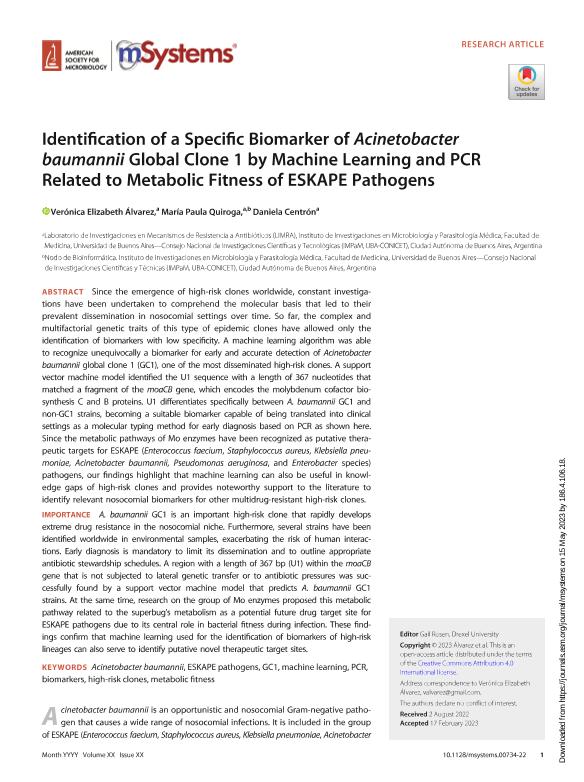Artículo
Identification of a Specific Biomarker of Acinetobacter baumannii Global Clone 1 by Machine Learning and PCR Related to Metabolic Fitness of ESKAPE Pathogens
Fecha de publicación:
02/2023
Editorial:
American Society for Microbiology
Revista:
mSystems
e-ISSN:
2379-5077
Idioma:
Inglés
Tipo de recurso:
Artículo publicado
Clasificación temática:
Resumen
Since the emergence of high-risk clones worldwide, constant investigations have been undertaken to comprehend the molecular basis that led to their prevalent dissemination in nosocomial settings over time. So far, the complex and multifactorial genetic traits of this type of epidemic clones have allowed only the identification of biomarkers with low specificity. A machine learning algorithm was able to recognize unequivocally a biomarker for early and accurate detection of Acinetobacter baumannii global clone 1 (GC1), one of the most disseminated high-risk clones. A support vector machine model identified the U1 sequence with a length of 367 nucleotides that matched a fragment of the moaCB gene, which encodes the molybdenum cofactor biosynthesis C and B proteins. U1 differentiates specifically between A. baumannii GC1 and non-GC1 strains, becoming a suitable biomarker capable of being translated into clinical settings as a molecular typing method for early diagnosis based on PCR as shown here. Since the metabolic pathways of Mo enzymes have been recognized as putative therapeutic targets for ESKAPE (Enterococcus faecium, Staphylococcus aureus, Klebsiella pneumoniae, Acinetobacter baumannii, Pseudomonas aeruginosa, and Enterobacter species) pathogens, our findings highlight that machine learning can also be useful in knowledge gaps of high-risk clones and provides noteworthy support to the literature to identify relevant nosocomial biomarkers for other multidrug-resistant high-risk clones. IMPORTANCE A. baumannii GC1 is an important high-risk clone that rapidly develops extreme drug resistance in the nosocomial niche. Furthermore, several strains have been identified worldwide in environmental samples, exacerbating the risk of human interactions. Early diagnosis is mandatory to limit its dissemination and to outline appropriate antibiotic stewardship schedules. A region with a length of 367 bp (U1) within the moaCB gene that is not subjected to lateral genetic transfer or to antibiotic pressures was successfully found by a support vector machine model that predicts A. baumannii GC1 strains. At the same time, research on the group of Mo enzymes proposed this metabolic pathway related to the superbug's metabolism as a potential future drug target site for ESKAPE pathogens due to its central role in bacterial fitness during infection. These findings confirm that machine learning used for the identification of biomarkers of high-risk lineages can also serve to identify putative novel therapeutic target sites.
Archivos asociados
Licencia
Identificadores
Colecciones
Articulos(IMPAM)
Articulos de INSTITUTO DE INVESTIGACIONES EN MICROBIOLOGIA Y PARASITOLOGIA MEDICA
Articulos de INSTITUTO DE INVESTIGACIONES EN MICROBIOLOGIA Y PARASITOLOGIA MEDICA
Citación
Alvarez, Verónica Elizabeth; Quiroga, María Paula; Centrón, Daniela; Identification of a Specific Biomarker of Acinetobacter baumannii Global Clone 1 by Machine Learning and PCR Related to Metabolic Fitness of ESKAPE Pathogens; American Society for Microbiology; mSystems; 8; 3; 2-2023; 1-20
Compartir
Altmétricas




